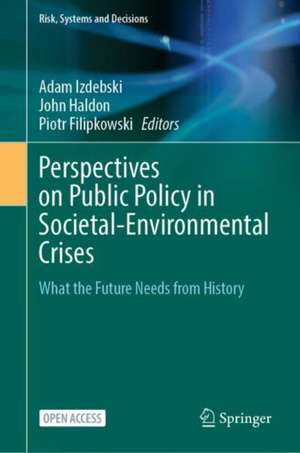Perspectives on Public Policy in Societal-Environmental Crises: What the Future Needs from History: Risk, Systems and Decisions
Editat de Adam Izdebski, John Haldon, Piotr Filipkowskien Limba Engleză Paperback – 15 iul 2022
Histories we tell never emerge in a vacuum, and history as an academic discipline that studies the past is highly sensitive to the concerns of the present and the heated debates that can divide entire societies. But does the study of the past also have something to teach us about the future? Can history help us in coping with the planetary crisis we are now facing?
By analyzing historical societies as complex adaptive systems, we contribute to contemporary thinking about societal-environmental interactions in policy and planning and consider how environmental and climatic changes, whether sudden high impact events or more subtle gradual changes, impacted human responses in the past. We ask how societal perceptions of such changes affect behavioral patterns and explanatory rationalities in premodernity, and whether a better historical understanding of these relationships can inform our response to contemporary problems of similar nature and magnitude, such as adapting to climate change.
| Toate formatele și edițiile | Preț | Express |
|---|---|---|
| Paperback (1) | 301.46 lei 38-44 zile | |
| Springer International Publishing – 15 iul 2022 | 301.46 lei 38-44 zile | |
| Hardback (1) | 433.47 lei 3-5 săpt. | |
| Springer International Publishing – 15 iul 2022 | 433.47 lei 3-5 săpt. |
Preț: 301.46 lei
Nou
Puncte Express: 452
Preț estimativ în valută:
57.69€ • 60.01$ • 47.63£
57.69€ • 60.01$ • 47.63£
Carte tipărită la comandă
Livrare economică 10-16 aprilie
Preluare comenzi: 021 569.72.76
Specificații
ISBN-13: 9783030941390
ISBN-10: 3030941396
Pagini: 347
Ilustrații: IX, 347 p. 46 illus., 34 illus. in color.
Dimensiuni: 155 x 235 mm
Ediția:1st ed. 2022
Editura: Springer International Publishing
Colecția Springer
Seria Risk, Systems and Decisions
Locul publicării:Cham, Switzerland
ISBN-10: 3030941396
Pagini: 347
Ilustrații: IX, 347 p. 46 illus., 34 illus. in color.
Dimensiuni: 155 x 235 mm
Ediția:1st ed. 2022
Editura: Springer International Publishing
Colecția Springer
Seria Risk, Systems and Decisions
Locul publicării:Cham, Switzerland
Cuprins
1. Introduction: what sort of past does our future need?.- Part I: History and public policy in the era of planetary crisis.- 2. What stories should historians be telling at the dawn of the Anthropocene?.- 3. The Anthropocene contract. What kind of historian–reader agreement does environmental historiography need?.- 4. History and utopian thinking in the era of the Anthropocene.- 5. Potentials and risks of futurology: lessons from late socialist Poland.- 6. Globalization as adaptive complexity: learning from failure.- 7. Disjunctures of practice and the problems of collapse.- Part II: Climate change.- 8. Geoengineering and the Middle Ages: Lessons from medieval volcanic eruptions for the Anthropocene.- 9. A perfect tsunami? El Nino, War and Resilience on Aceh, Sumatra.- 10. Social Responses to Climate Change in a Politically Decentralized Context: A Case Study from East African History.- 11. Resilience at the Edge: Strategies of Small-Scale Societies for Long-Term Sustainable Living in Dryland Environments.- 12. Beyond Boom and Bust: Climate in the History of Medieval Steppe Empires (c. 550-1350 CE).- 13. Lessons for Modern Environmental and Climate Policy from Iron Age South Central Africa.- Part III: Crisis and recovery.- 14. Systemic Risk and Resilience: The Bronze Age Collapse and Recovery.- 15. Panarchy and the Adaptive Cycle: A Case Study from Mycenaean Greece.- 16. Managing the Roman Empire for the long term: risk assessment and management policy in the fifth to seventh centuries.- 17. Success and Failure in the Norse North Atlantic: Origins, Pathway Divergence, Extinction and Survival.- 18.Resilience of coupled socio-ecological systems: historic rice fields of the U.S. south.- 19. The Short- and Long-Term Effects of an Early Medieval Pandemic.- Part IV: Migration and the environment.- 20. The integration of settlers into existing socio-environmental settings: reclaiming the Greek lands after the Late Medieval crisis.- 21. Eastward migration in European history: the interplay of economic and environmental opportunities.- 22. The Environmental Dimension of Migration: the case of Post-WWII Poland.- Part V: Conclusions.- 23. Concluding remarks: interdisciplinarity and public policy.
Textul de pe ultima copertă
This is an open access book.
Histories we tell never emerge in a vacuum, and history as an academic discipline that studies the past is highly sensitive to the concerns of the present and the heated debates that can divide entire societies. But does the study of the past also have something to teach us about the future? Can history help us in coping with the planetary crisis we are now facing?
By analyzing historical societies as complex adaptive systems, we contribute to contemporary thinking about societal-environmental interactions in policy and planning and consider how environmental and climatic changes, whether sudden high impact events or more subtle gradual changes, impacted human responses in the past. We ask how societal perceptions of such changes affect behavioral patterns and explanatory rationalities in premodernity, and whether a better historical understanding of these relationships can inform our response to contemporary problems of similar nature and magnitude, such as adapting to climate change.
Caracteristici
The only collective multidisciplinary survey of historical responses to risk, mitigation and resilience International group of specialists in several fields working collaboratively Directly responds to current concerns about relevance of historical lessons for contemporary policy This book is open access which means you have free and unlimited access













